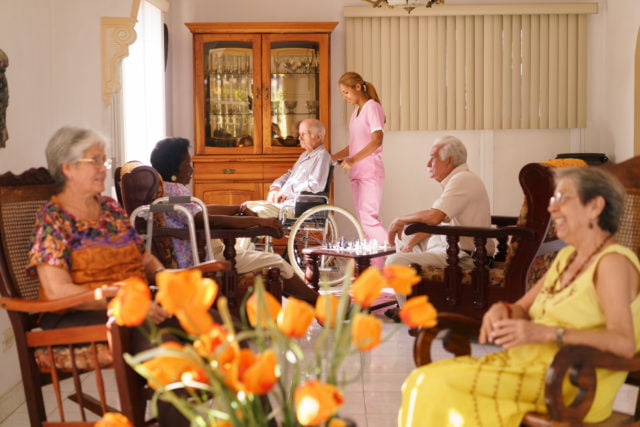Filter


Day Care Costs Factor into Mom’s Work
In 26 states, the average cost of full-time care for just one infant at a day care center approaches or exceeds $10,000 a year, according to ChildCare Aware of America. No wonder many new mothers (and sometimes fathers) ask themselves: Is it even worth it to work in the first place? Proposals by both presidential candidates to subsidize care for the nation’s 11 million pre-schoolers amount to non-partisan recognition that parents need some help. The IRS does provide a child care tax credit of up to $3,000 for one child and to $6,000 for two. But despite this, the United States lags well behind Europe in the financial assistance extended to parents of young children. The result is that t…
October 4, 2016
Is There a Senior Housing “Crisis”?
Headlines about how much senior housing the aging baby boom generation is going to require often include the word “crisis.” But it might be time to rethink our dire assumption that there won’t be enough housing for seniors, since boomers are living longer and are healthier than past generations and are changing what it means to grow old in this country. One example is the U.S. nursing home population, which has remained fairly stable even though the elderly population is growing, according to a 2010 report by the Stanford Center on Longevity. The center cited better health as a key contributing factor. Taking trends like these into account, a California real estate services firm has raised the age assumptions it uses…
September 29, 2016
Annuities Have Real Value
The value that annuities can provide to retirees may not be obvious, but it is real. Annuities are also becoming increasingly valuable as fewer people have that traditional source of reliable retirement income: an employer pension. Insurance company annuities, like pensions, pay out a monthly income no matter how long you live. These payments come from three sources: 1) the initial amount invested to purchase the policy; 2) the interest earned on the amount that’s invested before it is paid out; and 3) “mortality credits.” These mortality credits are the essential element that protects retirees from outliving their savings. As a retiree moves through her 80s, a growing share of the other people in the annuity pool die. The funds…
September 27, 2016
Seniors Enjoy More Disability-Free Years
Persistent increases in U.S. life expectancy are widely recognized. But if we’re living longer, what’s also important is whether those additional years of life are healthy years. Even using this higher standard, the news is good. A 65-year-old American today can expect to live to about age 84 – or about one year and four months longer than a 65-year-old in the early 1990s, according to a new study. But there was a bigger increase – one year and 10 months – in the time the elderly enjoy being free of disabling medical conditions that limit their quality of life. The researchers, a team of economists and biostatisticians at Harvard, pinpointed two conditions that are the dominant reasons the elderly…
September 22, 2016
Lift SNAP’s Asset Test and People Save
When a low-wage worker has a dental emergency or the car breaks down, it can set off a chain reaction of financial problems. Losing a job due to that car problem is a catastrophe. It’s not an exaggeration to say that having just a little money in a bank account is a lifesaver. But low-income Americans are discouraged from saving due to the asset limits in joint federal-state assistance programs such as food stamps, Medicaid, and Temporary Assistance to Needy Families. These asset limits create a Catch-22: if the recipient builds up the savings crucial to their financial well-being, they lose their assistance, which is also critical to their well-being. This illustrates just how difficult it is to design programs…
September 20, 2016
When a Diamond Isn’t Forever
While student loans are a painful, long-term expense, they are also an investment in one’s career and earnings prospects. But what does lavish spending on a wedding provide? It can lead to divorce, according to a study by Emory University researchers Andrew Francis and Hugo Mialon. More interesting, they suggest that the stress that comes with wedding debt might be the underlying cause for the unhappy outcomes. Weddings, which peak in early summer and surge again in the fall, have become more elaborate over the years. Engagement rings usually have diamonds – that wasn’t always the case. The average expense for a wedding and reception in this country is now $30,000. But the researchers found that women who spend more than $20,000 on…
September 15, 2016
Parents’ Dilemma: Kids Who Don’t Launch
Karen James and John Kingrey remember very clearly breaking the news to their Millennial son that they would no longer support him. After struggling through his first year in college, Michael was sitting on his parents’ bed tossing around whether or not he should join the U.S. Navy. “I said, ‘You don’t have to join the Navy, but you’re not living here. And winter’s coming,’ ” Karen James recalled. And then she thought, but did not say, what many parents before her have thought about the offspring they love: “You’re not living here doing nothing.” Easing their son out the door in the run-up to the couple’s 2014 retirement “was one of the toughest things we ever did,” John Kingrey said. Their…
September 13, 2016
Women Often Quit Work to Help Parents
Here’s just some of the evidence of the enormity of the challenge of caring for our elderly parents: One in three baby boomer women cares for an elderly parent. Even if they work, these caregivers devote anywhere from eight to 30 hours per week to that parent. The estimated value of informal senior care provided by family members approaches $500 billion in this country – or double the amount spent on formal, paid care. Caring for an elderly parent is usually done with love or out of a feeling of familial obligation. But there are real costs to taking on this responsibility, which most often lands squarely on a daughter’s shoulders. These costs could come in the form of lost wages…
September 8, 2016
Wives Pay Price to Retire with Husbands
Wives like to retire around the same time as their older husbands – so they can play. But what a difference the baby boom generation has made. For boomer wives, as members of the first generation of women to enter the U.S. labor force en masse, there can be a steep cost to leaving the labor force at a relatively young age to retire with an older husband. New research by Nicole Maestas of the Harvard Medical School bears out this logic. It’s obvious that working wives can increase their earnings from work by resisting the urge to retire at a relatively young age. And married women generally earn much more, relative to their husbands, than in the past. But,…
September 6, 2016
Seniors Find an Affordable Haven
Mary Roby The stress of living with her son and daughter-in-law made Mary Roby’s blood sugar spike. But when she began her search for an independent senior housing community, affordable and nice never seemed to come in the same package. Roby, who is 80, said she looked around quite a bit. A one-room place in the Boston area for $4,500 a month had no senior services, a limited kitchen, and was housed in a poorly maintained building. She also knew, through her son’s in-laws, about a high-end assisted living community with extensive services, but it charged more than $6,000. Then she found Shillman House, which was both affordable and nice. “I love it here,” Roby said about the independent senior housing community…
August 30, 2016
Senior Housing a Remedy for Loneliness
After his wife of 36 years died from cancer, Dick St. Lawrence experienced something new: loneliness. “Worst feeling in the world,” St. Lawrence, 81, said about Linda St. Lawrence’s death in the winter of 2014. Like many widows and widowers before him, he had to build a new life for himself, despite having the comfort of a large family of four living children, six grandchildren and seven great-grandchildren. His first small step was accepting an invitation to play poker at Shillman House, an independent housing community for seniors owned and operated by Jewish Community Housing for the Elderly. The man who called to invite St. Lawrence knew a woman who used to play Mahjongg with Linda. Next thing he knew,…
August 25, 2016
From Anxious Child to Finance Star
An interesting psychology powers this video in which the youngest daughter of a low-income, single mother explains how she migrated into the financial services industry – and then became the company president. Mellody Hobson’s fascination with finance took hold as she watched her mother struggle with evictions, repossessed cars, and empty gas tanks. She once spent all her money on her daughters’ Easter dresses but then couldn’t pay the phone bill, Hobson recalls in the video above. “I do not think it’s an accident I work in the financial industry,” she explains, “because as a child I was desperate to understand money – desperate. I hated the fact that I felt this insecurity around money.” Hobson is a celebrity in…















